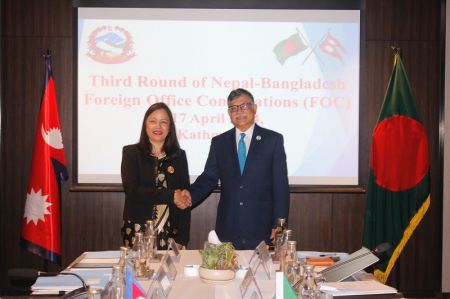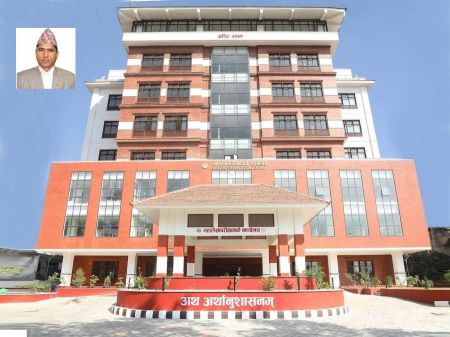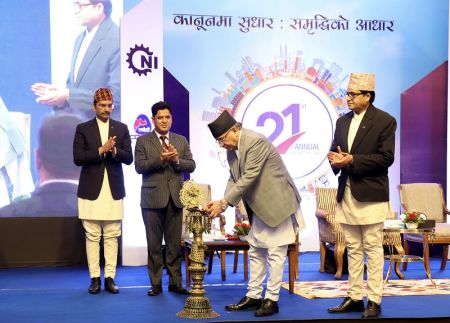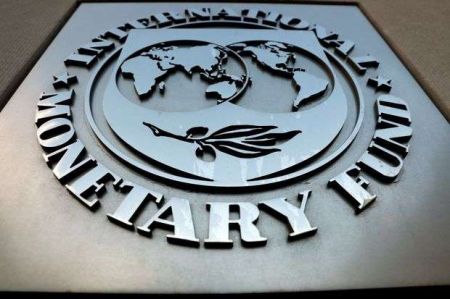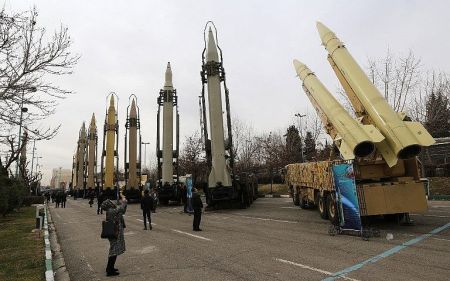
Rajesh Kazi Shrestha is Chairman of Nepal China Chamber of Commerce & Industry (NCCCI) and International Chamber of Commerce, Nepal (ICC, Nepal). In the past, he has been in charge of various organizations, such as the Nepal Chamber of Commerce. He is also the former Assistant Minister at Ministry of Industry, Commerce and Supplies. He spoke with Siromani Dhungana of New Business Age about Nepal-China Chamber of Commerce and Industry and its involvement in promoting country’s business environment.
Excerpts:
How do you see the current role of Nepal’s private sector?
Private sector should be taken as the engine of the national economy. Even though the entire country has been facing power scarcity and political instability, Nepal’s private sector is optimistic about leading the country to economic prosperity. In fact, private sector has been playing a crucial role for the overall economic development of the country.
What is Nepal-China Chamber of Commerce and Industry doing to address the problem of growing deficit in Nepal’s trade with China?
Actually, Nepal-China Chamber of Commerce and Industry is established to promote export of Nepali products to China and Chinese products to Nepal. In order to address growing trade deficit figure, we are doing our best to promote more Nepali products in China. The organization has been participating in many promotional activities such as trade fairs where we can promote Nepali products.
Due to our promotional activities over the past few years, we can now say that many handicraft, thangka painting and wooden crafts entrepreneurs in many districts, including Lalitpur and Bhaktapur, are benefitted. However, those handicraft entrepreneurs from Lalitpur and Bhaktapur cannot survive if there are no Chinese buyers of their products. There are more examples of other sectors like this that show how Chinese market is becoming more important for us. It is also important to mention here that Nepal and China have signed zero tariff agreement, which ensures export of more than 7,787 items at zero-tariff into chinese market. The provision helps us to expand our trade with China. Nepal should also put its effort on trade promotion between the two countries. The construction of a well-facilitated dry port and a Special Economic Zone would help us to boost trade with China and to attract more Chinese investment. Now, we are more focused on how to get more facilities for our exporters, so we have requested support from the Finance Minister in order to increase trade between both countries.
Nepali traders have failed to take advantage of zero tariff facility provided by China, why?
I do not think so. In fact, there are some norms set by the Chinese government which Nepali side has been failing to comply with. Especially, there are some problems such as the issuance of Certificate of Origin.
Non tariff barriers such as strict quarantine system, certification standards and rules of origin have created many challenges to the process of trade between the two countries. It’s obvious that there is a lack of effective coordination among Nepali traders and government agencies. Also, there are some other complications on both sides.
We are working to sort out current problems and we are optimistic about the settling of these issues very soon. We want to see a concrete agreement to ease quarantine related complications and other non-tariff barriers.
China’s Exim Bank is likely to set up its branch in Nepal. Considerig that Nepal didn’t get the expected benefits from the other foreign banks operating in Nepal,
What should Nepal do to get benefits from the presence of Chinese Bank?
We have been talking about the presence of Chinese Bank in Nepal for the last three or four years. It is not only for trading but also for investment. Chinese side is very positive. The current Chinese Ambassador is optimistic about the fact that Chinese Bank will start operating in Nepal during his tenure. Not only Exim Bank but also some other banks are negotiating about starting to offer their services in Nepal. If Exim Bank comes, it will have a positive impact on investment. Chinese banks have rational interest rate and also they have capacity to invest. Their presence will definitely help to attract Chinese investors to Nepal.
Chinese investment in Nepal is increasing pretty fast in the recent years. Do you think that Chinese investment is actually helping Nepal? (it is also said that the interest of the Chinese in Nepal is more diplomatic than economic)
Yes, the Chinese investment in Nepal is increasing at a rapid pace. Some mega projects such as Pokhara Airport, Kathmandu Ring Road or Dry Port of Sindhupalchowk will be started soon. Similarly, some Chinese investors are involved in mining and water resources projects too. Very soon, if the political situation improves, more Chinese investors will be interested in investing in Nepal.
Chinese investment may help the overall national development. As we represent the private sector, our main interest is to strengthen the trade and the economic relation between the two countries. We always lobby for the economic prosperity and investment with the Government of China and our other counterparts. Together, these two countries can achieve good economic prosperity.
What are the possible investment areas for China in Nepal? Would it be resource-seeking or market-seeking? Obviously, it not technology seeking, capital seeking or manpower seeking as China is better than Nepal in all these.
Obviously, the first is hydropower sector. Second is tourism, third is mines and minerals and fourth is the agro sector. Nepal has enough resources and lots of business opportunities; however, it is a fact that the current investment size is extremely small. Chinese businessmen have been investing in small-scale sector such as hotels, restaurants and other small trades but we want Chinese investors to start some mega projects. The problem is that the unstable government and policies and the problem of power outage have created much hurdles to attract such investment. Despite the hurdles, there are still many chances to expedite Nepal-China business relationship. Around two or three Chinese delegations have been visiting Nepal every month to explore business opportunities. Chinese investors are very much interested but they often ask about the rules, regulations and opportunities. If the political scenario becomes stable and labour problem is solved, I hope many of them will come to Nepal.
 Chinese goods have the reputation of being cheap and inferior in quality. In this context, what prospects do you see for such products in Nepal?
Chinese goods have the reputation of being cheap and inferior in quality. In this context, what prospects do you see for such products in Nepal?
It is not like that. Chinese manufactures produce goods according to the necessity of consumers. It depends on the type of goods consumers want. When you are in the USA, European countries or in most of Asian countries and seek high quality products, you will find Chinese ones. We get surprised when we see what we get here and what products are available there. It depends on the quality required and the purchasing power of the buyer. It depends on what type of goods Nepali traders want to import and that’s why I think it solely depends on the buyers’ choice and affordability.
How successful do you rate your own business link with China considering the general perception of Chinese goods being cheap and inferior?
We don’t evaluate the Chinese products supplied as per our demands and orders. The same goods can have high or low quality based on how much one can afford. It depends on our buying capacity. It’s us who are responsible for the low quality of the products because we often order low quality goods for Nepali market.
It is often cited that Nepali industries are suffering from the cheap imports from China. What’s your opinion?
Both Nepal and China are members of World Trade Organization (WTO). According to its principle, we can’t stop importing from its member countries. If we are able to manage our market, we don’t have to worry about cheap imports from China. On the other side, cheap goods imported from China have ensured mass access to the sophisticated goods and also to the daily consumable goods.
What are the critical trade barriers between Nepal and China?
There are hurdles and barriers in all sectors but it is still an open and growing market. Some remedies would be to have better policies from the government, a friendly investment environment, labour reforms, security… etc. There are certain issues which should be resolved. We are solving the barriers step by step, as they appear in front of us.
How are the exporters and importers overcoming the language barrier in trade between China and Nepal? How is your chamber helping in this? (it is said that, due to language problems, Nepali traders in China are always in disadvantage in their dispute with Chinese importers or exporters)
Yes, it is a little difficult but now most of the Chinese exporters understand English. Nowadays, there are English speaking employees in almost every office and different chambers. And some businessmen who are already doing business can understand Chinese also. If there is any dispute we step in to solve it, we are also giving information about the queries and problems of the business person there. The exporters were very much interested in trade fair there, we are participating there regularly and we exchange our delegation also from different chamber from different aspects.
What points do you think need to be revised in Nepal-China trade-related treaties?
Both governments should have frequent meetings to understand and solve the obstacles, if there are. There are some area where we are facing problems, such as quarantine or infrastructures but these issues should be solved very soon. In China, they are not accepting Nepali quarantine certificates. Nepal has three issuing authorities for different sectors and product lines, which makes the Chinese confused as they think it should be done by a single authority. Because of that, we are facing difficulties to export our food items.
 The Nepali government has planned to develop Rasuwa as another hub for Nepal-China trade. What is your assessment of the progress in this?
The Nepali government has planned to develop Rasuwa as another hub for Nepal-China trade. What is your assessment of the progress in this?
The road is already there and, after Sigatse, the railway will come to Rasuwa. We are trying to join railway side from China and India so that Nepal will be linked with both of these countries. We can develop environment for tourism and business also. The government of China is committed on this and we are very optimistic about completing and operating it soon.
It is often argued that Nepal should be developed as the transit point for China-India trade, but no concrete development seems to be taking place on this direction. What are the impediments?
We are not a land-locked country but we are a land-linked country with two economic giants at north and south. We should take advantage of this unique geographical position. The main problem of this situation is that everyone has his or her own agenda and we have no unified and strong agenda and vision for concrete developments. A stable government, a strong linkage of these three countries and an open transit road are our most primary necessities.










